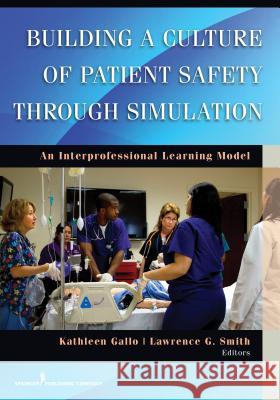Building a Culture of Patient Safety Through Simulation: An Interprofessional Learning Model » książka
Building a Culture of Patient Safety Through Simulation: An Interprofessional Learning Model
ISBN-13: 9780826169068 / Angielski / Miękka / 2014 / 232 str.
This book provides a dynamic and comprehensive interprofessional approach to building a culture of safety by using simulation across clinical and education spheres in healthcare... This is a comprehensive guide and resource for healthcare organizations, educators, and diverse interprofessional healthcare team members to use to improve patient safety efforts to adapt to the ever-changing, complex world of healthcare. Its practical application is pertinent in transforming the education and practice of medicine, nursing, and other health-related fields... Weighted Numerical Score: 99 - 5 Stars
Patricia West, MS, BSN
Michigan State University College of Nursing
Doody's Medical Reviews " The authors] have brought together a core group of national leaders to produce what I think is a paradigm-busting book that will help to transform education at the graduate level in medicine, nursing, and all related fields. The book speaks expertly about the high fidelity of simulation training, the need for synthetic models, the adult learning theory behind the debrief√nit is a manifesto about where we must go as an interprofessional team, caring for the patient of the future." From the Foreword, by David B. Nash, MD, MBA
Dean, Jefferson School of Population Health
Philadelphia, PA This groundbreaking book reflects the accomplishments of an internationally recognized leader of innovation regarding interprofessional clinical learning through simulation. Based on the North Shore-LIJ Health System corporate university experience, the book describes how this organization used simulation to successfully tackle the major interprofessional health issue of our time: patient safety. This health system created a transformative simulation center that involves nurses, doctors, and related health professionals whose work in clinical teams has resulted in measurable improvements in all aspects of clinical decision-making, critical thinking, teamwork, and communication skills√>=toward the ultimate goal of improved patient safety. Key Features:
- Describes in detail a groundbreaking system of achieving patient safety that uses interprofessional clinical learning through simulation
- Detailed case studies using concrete methods and examples illustrate the application of theory to practice
- Presents simulations scalable to any size organization and for use by health care professionals in all specialties
- Includes theoretical foundations and practical applications for teaching and learning
- Focuses on interprofessional cooperation and learning











